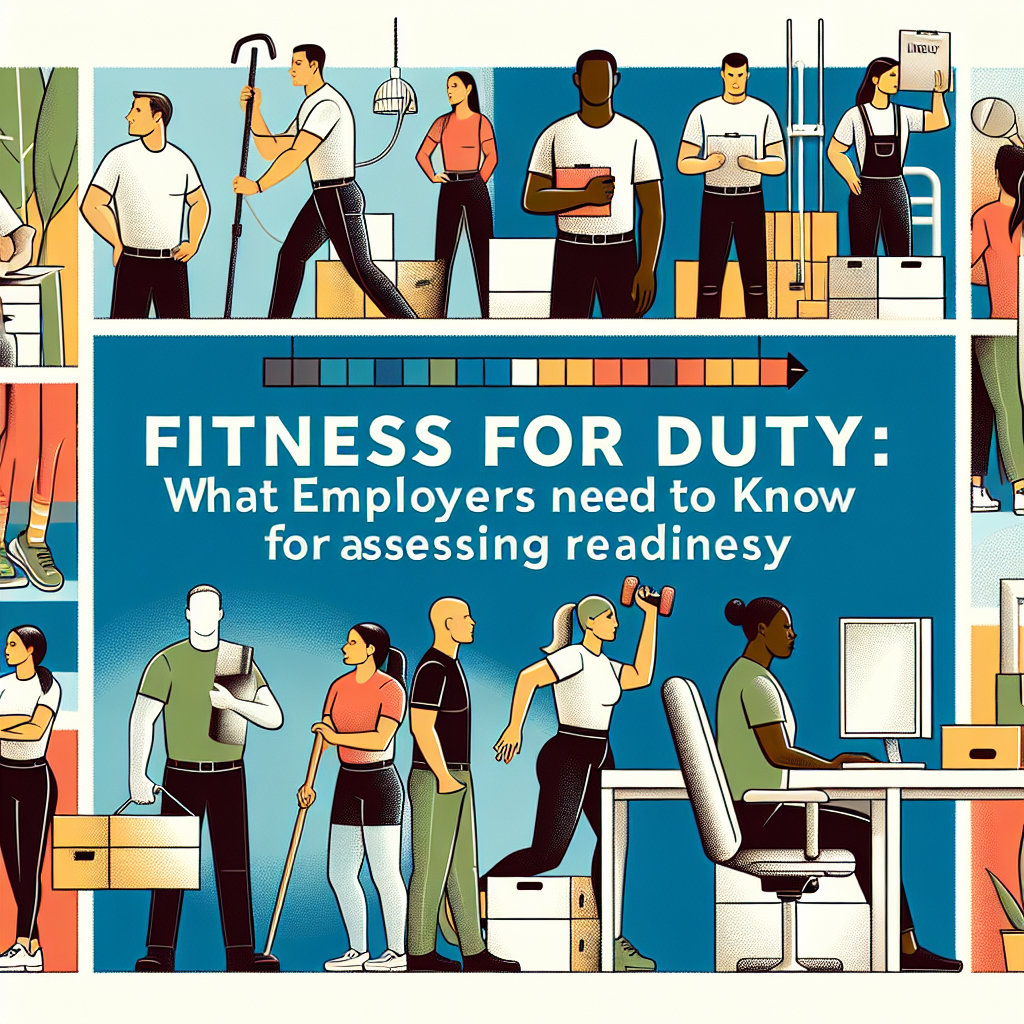
Introduction
In a rapidly evolving workplace landscape, the concept of Fitness For Duty (FFD) has emerged as a critical consideration for employers who aim to ensure both employee safety and organizational productivity. The question isn’t just whether an employee is fit for work; rather, it’s about understanding their overall readiness to perform their duties effectively. In this article, we’ll delve into Fitness For Duty: What Employers Need to Know About Assessing Readiness, providing insights into best practices, relevant laws, and real-world case studies to facilitate informed decision-making.
The Importance of Fitness For Duty Assessments
Defining Fitness For Duty
Fitness for Duty assessments evaluate an employee’s physical and mental ability to perform their job responsibilities safely and effectively. This evaluation is crucial in versatile industries such as healthcare, manufacturing, law enforcement, and even office environments. A comprehensive FFD assessment can help prevent workplace accidents, enhance employee morale, and minimize legal liabilities.
The Legal Landscape
Employers must navigate a complex legal framework regarding Fitness For Duty: What Employers Need to Know About Assessing Readiness. The Americans with Disabilities Act (ADA), for instance, dictates that any medical evaluations must be job-related and consistent with business necessity. Understanding these regulations is pivotal to ensuring compliance while safeguarding employee welfare.
Assessing Ready Employees: Essential Components
Physical Assessments
A physical fitness evaluation is often the first step in an FFD assessment. This could involve:
- Strength and endurance tests
- Vision and hearing examinations
- Drug and alcohol screenings
Employers need to determine the physical demands of the position to establish essential criteria for evaluation.
Psychological Evaluations
Mental fitness is equally vital. Psychological assessments may include:
- Personality tests
- Stress interviews
- Mental health screenings
Understanding mental readiness is crucial, especially in high-stress occupations. For example, police officers must handle intense situations, necessitating a clear mental state.
Specialized Assessments
Certain roles may require specialized evaluations. For instance, airline pilots undergo rigorous testing to assess their ability to handle emergencies and make critical decisions under pressure. Tailoring FFD assessments to specific job requirements ensures thorough evaluations.
Real-World Case Studies
Case Study 1: A Hospital’s Approach to FFD
Scenario: A regional hospital implemented FFD assessments for all nursing staff after noticing increased incidents of workplace errors.
Outcome: The assessments revealed that several staff members were struggling with mental fatigue, leading to errors in medication administration. By addressing these issues through wellness programs and mental health support, the hospital significantly reduced incidents, enhancing patient care and staff well-being.
Analysis: This case highlights how proactive FFD assessments can directly impact service quality and organizational culture.
Case Study 2: Manufacturing Safety Protocols
Scenario: A manufacturing company faced numerous safety violations due to personnel operating heavy machinery without proper fitness.
Outcome: By introducing mandatory FFD evaluations that included physical tests for strength and coordination, the company saw a 40% decline in workplace injuries over a year.
Analysis: This underscores the importance of aligning FFD evaluations with safety-critical functions within an organization.
Tools and Techniques for Effective Assessment
Digital Platforms and Evaluations
Many employers are turning to technological solutions to streamline FFD assessments. Online survey tools and mobile applications can facilitate mental health screenings and follow-ups, making assessment processes smoother and more efficient.
Integrating Wellness Programs
Combining FFD assessments with wellness programs can encourage employees to maintain their readiness proactively. Regular fitness challenges, mental health sessions, and even mindfulness training can cultivate a culture of wellness, ensuring that employees are always fit for their duties.
Fostering a Culture of Readiness
Employers play a vital role in fostering a culture that emphasizes the importance of Fitness For Duty: What Employers Need to Know About Assessing Readiness. By openly discussing the value of health, fitness, and well-being in the workplace, organizations can create an environment where employees feel supported in maintaining their readiness.
Conclusion
Understanding and implementing Fitness For Duty assessments is no longer optional for employers who seek to cultivate a safe, productive workplace. By adhering to legal guidelines, employing best practices in assessments, and fostering health-promoting initiatives, businesses can ensure their workforce remains fit and ready for duty. Ultimately, investing in these assessments pays dividends in safety, productivity, and employee morale.
FAQs
1. What does Fitness For Duty mean in the workplace?
Answer: Fitness For Duty refers to an employee’s ability to perform their job responsibilities safely and effectively. It encompasses both physical and mental readiness.
2. Are Fitness For Duty assessments mandatory?
Answer: While not always mandatory, many industries require FFD assessments, especially those associated with safety-sensitive roles such as healthcare, aviation, and manufacturing.
3. How can employers implement FFD assessments fairly?
Answer: Employers can implement fair assessments by ensuring they are job-related, applying consistent criteria, and complying with legal requirements like the Americans with Disabilities Act (ADA).
4. What should be included in a Fitness For Duty assessment?
Answer: A comprehensive FFD assessment should include physical evaluations, psychological assessments, and any specialized tests relevant to the job.
5. What are the potential risks of not conducting FFD assessments?
Answer: Not conducting FFD assessments can lead to increased workplace accidents, legal liabilities, decreased productivity, and a negative work environment, ultimately affecting the bottom line.
By understanding the nuances of Fitness For Duty: What Employers Need to Know About Assessing Readiness, employers can cultivate a more secure and productive workplace, ensuring that their employees are always ready to perform at their best.















